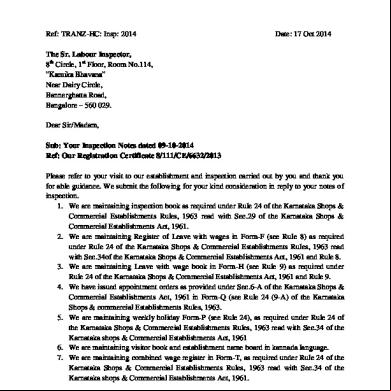Unfair Labour Practice 4i6t1b
This document was ed by and they confirmed that they have the permission to share it. If you are author or own the copyright of this book, please report to us by using this report form. Report l4457
Overview 6h3y3j
& View Unfair Labour Practice as PDF for free.
More details h6z72
- Words: 285
- Pages: 1
UNFAIR LABOUR PARCTICE ON THE PART OF WORKMEN and TRADE
UNIONS OF WORKMEN 1. To advise or actively or instigate any strike deemed to be illegal under this Act. 2. To coerce workmen in the exercise of their right to self-organisation or to a trade union or refrain from ing any trade union, that is to say : (a) for a trade union or its to picketing in such a manner that non-striking workmen are physically debarred from entering the work places; (b) to indulge in acts of force or violence or to hold out threats of intimidation in connection with a strike against non-striking workmen or against managerial staff. 3. For a recognised union to refuse to bargain collectively in good faith with the employer. 4. To indulge in coercive activities against certification of a bargaining representative. 5. To stage, encourage or instigate such forms of coercive actions as wilful "go slow", squatting on the work premises after working hours or "gherao" of any of the of the managerial or other staff. 6. To stage demonstrations at the residences of the employers or the managerial staff . 7. To incite or indulge in wilful damage to employer's property connected with the industry. Section 25T. Prohibition of unfair labour practice No employer or workman or a trade union, whether ed under the Trade Unions Act, 1926 (16 of 1926), or not, shall commit any unfair labour practice. Section 25U. Penalty for committing unfair labour practices – Any person who commits any unfair labour practice shall be punishable with imprisonment for a term which may extend to six months or with fine which may extend to one thousand rupees or with both.
UNIONS OF WORKMEN 1. To advise or actively or instigate any strike deemed to be illegal under this Act. 2. To coerce workmen in the exercise of their right to self-organisation or to a trade union or refrain from ing any trade union, that is to say : (a) for a trade union or its to picketing in such a manner that non-striking workmen are physically debarred from entering the work places; (b) to indulge in acts of force or violence or to hold out threats of intimidation in connection with a strike against non-striking workmen or against managerial staff. 3. For a recognised union to refuse to bargain collectively in good faith with the employer. 4. To indulge in coercive activities against certification of a bargaining representative. 5. To stage, encourage or instigate such forms of coercive actions as wilful "go slow", squatting on the work premises after working hours or "gherao" of any of the of the managerial or other staff. 6. To stage demonstrations at the residences of the employers or the managerial staff . 7. To incite or indulge in wilful damage to employer's property connected with the industry. Section 25T. Prohibition of unfair labour practice No employer or workman or a trade union, whether ed under the Trade Unions Act, 1926 (16 of 1926), or not, shall commit any unfair labour practice. Section 25U. Penalty for committing unfair labour practices – Any person who commits any unfair labour practice shall be punishable with imprisonment for a term which may extend to six months or with fine which may extend to one thousand rupees or with both.





